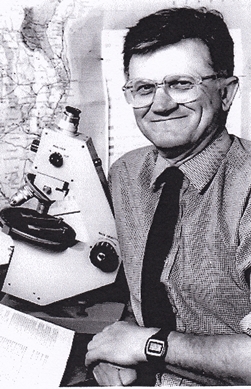 Distinguished structural geologist and expert on Precambrian gneiss complexes, particularly of Greenland and India.
Distinguished structural geologist and expert on Precambrian gneiss complexes, particularly of Greenland and India.
Brian was an active field and structural geologist who contributed greatly to the understanding of gneiss complexes via his work in Greenland and India. He died of a stroke in the Royal Devon and Exeter Hospital in Exeter, Devon, 17 October, 2015. In the four decades that I knew Brian (from a first year undergraduate to a continuing collaborator in this millennium), he never seemed to age – thus his death came as a great shock.
Brian was born a 'Man of Kent' in Canterbury, 11 March 1937, and was brought up on a fruit farm near Faversham. He was educated at a village school (1942-1948) and then at Queen Elizabeth’s Grammar School for Boys, Faversham (1948-1956). While at grammar school Brian met his future wife Vi, who was attending the neighbouring William Gibbs Grammar School for Girls. Two years after finishing school their paths crossed again, and in 1961 they were married.
Brian undertook National Service in the Royal Corps of Signals (1956-1958), and as one of his PhD students in the 1970s I remember well him regaling stories of his times there, that were both amusing and horrific. Subsequently he was at Imperial College, London (1958-1965), achieving a BSc Geology followed by a PhD (Alpine geology). In this period he was awarded the Watts Medal (1961) and participated in the University of London Expedition to Jan Mayen Island (1959).
Brian had a brief appointment as a Geologist in the Precambrian Geology Division, Department of Mineral Resources, Saskatchewan, Canada (1965-1966), prior to being appointed as a Lecturer in the University of Exeter (1966). It is at the University of Exeter that Brian worked until his retirement. Until 1990 he was at the Department of Geology. When that was closed in the grim farce that was the UGC 'rationalisation' of UK university geology departments, he was transferred to the Department of Geography until his retirement in 2001. Brian was a conscientious and proactive lecturer, and the clarity of his undergraduate instruction certainly drew me towards an interest in crystalline basement geology.
At Exeter and continuing afterwards, Brian had a very active research career, focusing on the tectonic - and to a lesser extent geochemical evolution - of gneiss complexes ranging in age from Caledonian to Archaean. A core component of this was lengthy field campaigns. Those in Greenland were as part of methodical mapping programmes of the Geological Survey of Greenland (GGU) and subsequently in the merged organisation the Geological Survey of Denmark and Greenland (GEUS). In these GGU and GEUS projects he contributed by his own mapping obligations, the compilation of entire 1:100,000 scale map sheets (Buksefjorden 63 V.1 Nord and Ivisârtoq 65 V.2 Syd) and also the mentoring and training of numerous PhD students.
In the course of his work in Greenland, he roamed the east coast from near Kap Farvel (Cape Farewell), up to the northern parts of the Caledonian orogen to approximately 77°N, and on the west coast up to the famous Isua supracrustal belt at about 65°N. From the mid-1970s his interests bifurcated, and with numerous Indian colleagues he also undertook extensive work in the Archaean Dharwar Craton of southern India. As in Greenland, this focused on an integrated understanding of ancient crustal evolution by all tools available, including U-Pb zircon geochronology. This latter work continued until well after his retirement, with the last international journal publication in 2007 – a holistic synthesis of Neoarchaean crustal evolution in the western Dharwar Craton. His work contributed strongly to the case that early Precambrian crustal evolution could be understood within the Plate Tectonic paradigm, and not by non-uniformitarian processes.
In this millennium Brian and Vi downsized from their house at the periphery of the University of Exeter, and moved to the small town of Ottery St. Mary, a short distance outside Exeter. In this period Brian wound back on his geological activities, but never entirely relinquished them.
Brian is survived by his wife Vi, his children Catherine, Elizabeth and Alexander and six grandchildren
Brian Chadwick: born 11 March 1937; died 17 October 2015.
Allen Nutman